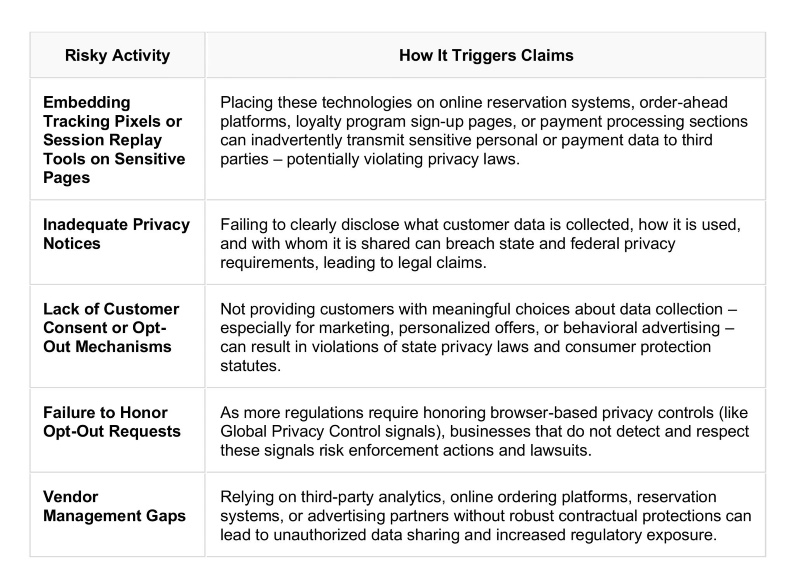Navigating the Rising Risk of Website Tracking Litigation: What Restaurants Need to Know
3 Min Read By Shawn Tuma
As modern restaurants continue to invest in digital platforms to better serve their customers, the use of website tracking technologies such as cookies, pixels, and session replay tools has become commonplace. These tools are essential for improving user experience, supporting marketing efforts, and ensuring operational efficiency. However, a surge in lawsuits and regulatory scrutiny across the country has made website tracking a significant legal and reputational risk for restaurants and hospitality businesses of all sizes, including those serving towns and rural communities across the United States.
Leaders of restaurants and hospitality businesses must understand the evolving landscape of website tracking litigation, recognize which activities can trigger claims, and implement robust compliance strategies to protect their businesses. If your restaurant or hospitality business receives a legal demand or lawsuit related to website tracking, experienced legal counsel can make all the difference.
Why Restaurants and Hospitality Businesses Are at Risk
While much of the recent focus has been on California’s privacy laws, the risk of website tracking litigation now extends nationwide. Critically, a restaurant or hospitality business does not need to be physically located in California, operate there, or even have California-based customers to be targeted. Plaintiffs’ attorneys can bring claims under California law on behalf of individuals who simply access a restaurant’s website or app from within the state.
Restaurants and hospitality operators are increasingly facing lawsuits alleging that their websites, mobile apps, or digital platforms use tracking technologies – such as cookies, pixels, or session replay tools – to collect and share customer data with third parties without proper disclosure or consent. These claims often cite violations of privacy laws such as the California Invasion of Privacy Act (CIPA), the California Consumer Privacy Act (CCPA), various state wiretapping statutes, and general consumer protection laws. The potential financial exposure is significant: for example, CIPA allows for statutory damages of $5,000 per violation, and class action lawsuits can quickly multiply these amounts into the millions.
In addition to state privacy laws, plaintiffs may allege that restaurants have breached their obligations under federal regulations – such as the Federal Trade Commission Act – by failing to adequately protect customer information or by sharing it without proper notice. These claims are often brought under a complex patchwork of state and federal laws, creating a challenging and high-stakes legal environment for restaurants, hospitality groups, and food service operators of all sizes.
What Business Activities Trigger Claims?
Several common practices can put restaurants and hospitality businesses at risk of website tracking litigation and regulatory scrutiny.

How Businesses Can Protect Themselves
To reduce the risk of website tracking litigation, restaurants and hospitality operators should implement the following best practices:
Audit Your Tracking Technologies
- Regularly review all tracking tools and scripts on your websites, mobile apps, and digital platforms.
- Ensure these tools do not collect or transmit personal or payment data without explicit customer consent.
Enhance Transparency and Consent
- Update privacy policies to clearly disclose all tracking activities.
- Implement robust cookie consent mechanisms that comply with applicable laws and allow users to opt in or out of non-essential tracking.
Limit Data Collection
- Only collect data necessary for your business purposes (e.g., order fulfillment, reservations, loyalty programs).
- Avoid gathering sensitive information unless absolutely required and legally justified.
Review Vendor Agreements
- Ensure contracts with third-party technology providers (such as online ordering, reservation, or marketing platforms) include strong data protection provisions.
- Clarify roles and responsibilities regarding data handling and compliance.
Regularly Assess Risks
- Periodically review your tracking practices.
- Stay informed about evolving legal requirements and regulatory guidance relevant to the hospitality industry.
Train Your Team
- Educate employees involved in website management, marketing, and customer data handling about privacy obligations and compliance best practices.
Responding to Website Tracking Claims: Practical Guidance
If your restaurant or hospitality business receives a demand letter or lawsuit related to website tracking, it’s crucial to respond promptly and strategically. Legal and technical professionals can provide valuable support in the following areas:
- Technical Audits and Forensic Reviews: Assess your digital platforms for tracking tools and data flows.
- Legal Evaluation: Analyze the legal basis of claims and assess potential exposure under relevant state and federal laws.
- Response Preparation: Draft responses to demand letters and formal complaints.
- Litigation Management: Handle motions, class action defense, and settlement negotiations.
- Regulatory Communications: Facilitate discussions with regulators and ensure compliance improvements.
- Ongoing Compliance Counseling: Advise on best practices to reduce future risk and maintain customer trust.
By understanding which business activities trigger website tracking claims and implementing robust compliance measures, restaurants and hospitality businesses can better manage risk, maintain compliance, and protect regulatory environment.

